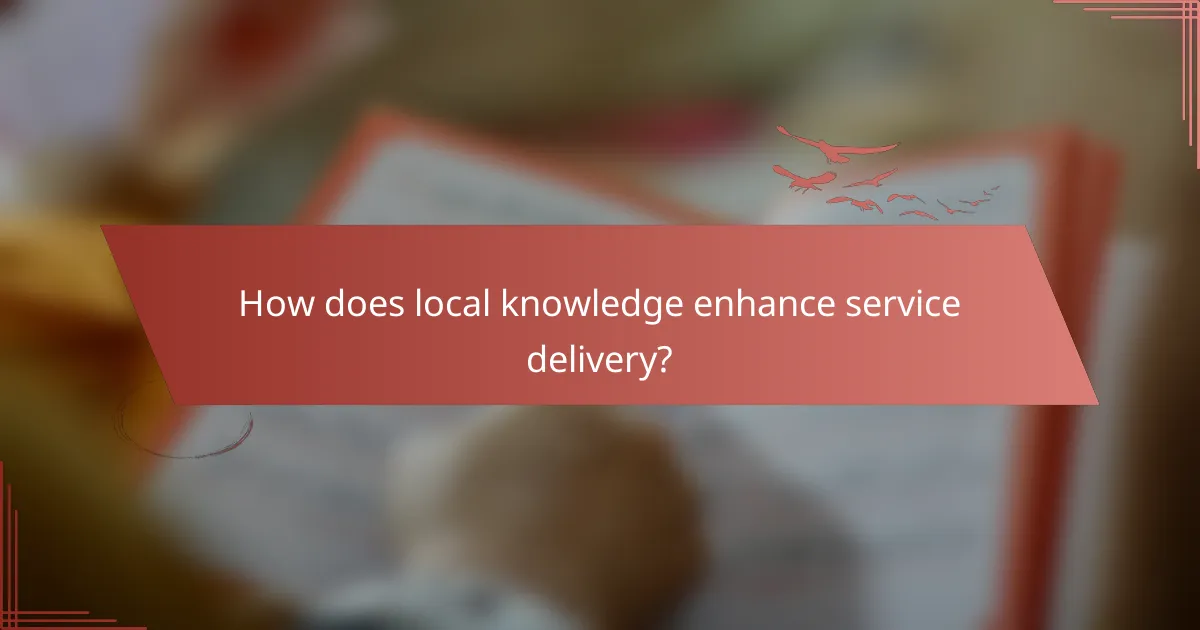Local knowledge plays a crucial role in enhancing service delivery by offering valuable insights into the specific needs and preferences of a community. By leveraging this understanding, service providers can tailor their offerings, resulting in improved customer satisfaction and more effective outcomes. Industries such as healthcare, hospitality, and retail particularly benefit from this localized approach, allowing them to better meet the unique demands of their clientele.

How does local knowledge enhance service delivery?
Local knowledge significantly enhances service delivery by providing insights into community needs, preferences, and behaviors. This understanding allows service providers to tailor their offerings more effectively, leading to better outcomes for both customers and businesses.
Improved customer satisfaction
When service providers leverage local knowledge, they can create experiences that resonate with customers. Understanding cultural nuances and local preferences helps in crafting services that meet specific expectations, resulting in higher satisfaction rates.
For example, a restaurant that knows the local palate can adjust its menu to include popular regional dishes, which can lead to increased customer loyalty and positive word-of-mouth.
Faster response times
Local knowledge enables quicker identification of issues and more efficient problem-solving. Service providers familiar with the area can navigate local infrastructure and regulations more effectively, reducing delays.
For instance, a delivery service with local expertise can optimize routes based on traffic patterns and local events, ensuring that deliveries are made in a timely manner, often within single-digit minutes during peak hours.
Tailored services
By understanding the unique characteristics of a community, service providers can offer tailored services that address specific needs. This customization can lead to more relevant offerings and a stronger connection with customers.
For example, a local gym might offer classes that cater to the fitness trends popular in the area, such as outdoor boot camps in a community that values fitness and nature, enhancing member engagement and retention.

What are the key benefits of leveraging local knowledge?
Leveraging local knowledge provides significant advantages in service delivery, enhancing effectiveness and customer satisfaction. Understanding the local context allows businesses to tailor their offerings, ensuring they meet the specific needs and preferences of the community.
Increased trust and credibility
Utilizing local knowledge fosters trust and credibility among customers. When businesses demonstrate an understanding of local customs, values, and needs, they create a sense of reliability that attracts and retains clients.
For example, a restaurant that incorporates regional dishes into its menu is likely to resonate better with local patrons than one that does not. This alignment with local tastes can lead to positive word-of-mouth and repeat business.
Better market insights
Local knowledge equips businesses with valuable market insights that drive informed decision-making. Understanding local trends, consumer behavior, and competitive dynamics enables companies to identify opportunities and risks effectively.
For instance, a retailer aware of seasonal buying patterns in their area can optimize inventory and marketing strategies, resulting in improved sales performance. Conducting surveys or engaging with community members can further enhance these insights.
Stronger community relationships
Building stronger community relationships is a direct benefit of leveraging local knowledge. Businesses that engage with local stakeholders, such as residents and organizations, can create partnerships that enhance their reputation and support.
Participating in community events or supporting local causes can solidify these relationships. For example, a company that sponsors a local sports team not only gains visibility but also demonstrates commitment to the community, fostering loyalty among customers.

Which industries benefit most from local knowledge?
Industries that thrive on local knowledge include healthcare, hospitality, and retail. Understanding the unique characteristics of a community allows these sectors to tailor their services, improve customer satisfaction, and enhance operational efficiency.
Healthcare services
In healthcare, local knowledge is crucial for understanding patient demographics, prevalent health issues, and cultural sensitivities. Providers can better address community-specific health needs, leading to improved patient outcomes and trust.
For example, a clinic in a region with a high population of elderly individuals may prioritize services like geriatric care and chronic disease management. Additionally, being aware of local health regulations and insurance options can streamline patient access to necessary services.
Hospitality and tourism
The hospitality and tourism industry heavily relies on local knowledge to enhance guest experiences. Understanding local attractions, dining options, and cultural events allows businesses to create tailored experiences that resonate with visitors.
Hotels and tour operators can benefit from partnerships with local businesses, offering packages that include unique local experiences. For instance, a hotel in a coastal area might promote water sports and seafood dining, appealing to tourists seeking authentic local culture.
Retail businesses
Retail businesses gain a competitive edge through local knowledge by aligning their product offerings with community preferences and trends. Understanding local buying habits and seasonal demands can significantly influence inventory decisions.
For instance, a retail store in a college town may stock more affordable, trendy clothing and school supplies during the back-to-school season. Engaging with the community through events or promotions can also foster loyalty and increase foot traffic.

What strategies can businesses implement to utilize local knowledge?
Businesses can leverage local knowledge by engaging with the community, forming partnerships, and training employees. These strategies help companies understand local needs, preferences, and cultural nuances, enhancing service delivery and customer satisfaction.
Community engagement initiatives
Community engagement initiatives involve actively participating in local events and supporting local causes. Businesses can sponsor local sports teams, host workshops, or participate in community fairs to build relationships and trust within the community.
These initiatives not only enhance brand visibility but also provide valuable insights into local customer preferences. Engaging with residents can reveal specific needs and expectations that a business can address, leading to more tailored services.
Local partnerships and collaborations
Forming partnerships with local organizations can significantly enhance a business’s understanding of the local market. Collaborations with local suppliers, non-profits, or educational institutions can provide access to unique insights and resources.
For example, a restaurant might partner with local farms to source ingredients, which not only supports the local economy but also allows the business to promote fresh, local produce. Such partnerships can enhance credibility and foster loyalty among local customers.
Employee training programs
Implementing employee training programs focused on local knowledge is crucial for effective service delivery. Training can include cultural sensitivity, local history, and customer service tailored to the community’s specific needs.
Businesses should encourage employees to participate in local events and engage with the community. This hands-on experience helps employees develop a deeper understanding of local preferences, enabling them to provide more personalized and effective service.

How can businesses measure the impact of local knowledge on service delivery?
Businesses can measure the impact of local knowledge on service delivery through various methods that capture customer experiences and operational performance. By analyzing customer feedback, performance metrics, and community engagement, companies can gain insights into how local understanding enhances service quality and customer satisfaction.
Customer feedback surveys
Customer feedback surveys are a direct way to gauge the impact of local knowledge on service delivery. These surveys can include questions about the relevance of services to local needs, satisfaction with local staff, and overall service experience. Aim for a response rate of at least 20-30% to ensure the data is representative.
To maximize effectiveness, consider using a mix of quantitative ratings and open-ended questions. This allows customers to express specific concerns or praise that can reveal how local knowledge influences their perceptions of service quality.
Service performance metrics
Service performance metrics provide quantifiable data on how well services meet local expectations. Key metrics include response times, resolution rates, and customer retention figures. Tracking these metrics over time can help identify trends linked to local knowledge enhancements.
For instance, if a business implements local training for staff and subsequently sees a drop in average response times by 15-20%, it may indicate that local knowledge is positively impacting service efficiency. Regularly review these metrics to adapt strategies as needed.
Community engagement statistics
Community engagement statistics reflect how well a business connects with its local audience. Metrics such as participation in local events, social media engagement rates, and partnerships with local organizations can indicate the effectiveness of local knowledge in service delivery. High engagement often correlates with increased customer loyalty.
To effectively measure community engagement, track the number of interactions and feedback received during local initiatives. For example, if a business hosts a community event and sees a significant increase in social media mentions or attendance, it suggests that local knowledge is enhancing its visibility and reputation.

What are the challenges of integrating local knowledge?
Integrating local knowledge into service delivery faces several challenges that can hinder effective implementation. Key issues include difficulties in data collection, resistance to change among stakeholders, and resource allocation problems that can limit the integration process.
Data collection difficulties
Collecting accurate local knowledge can be challenging due to varying levels of accessibility and reliability of information sources. Local communities may have informal data that is not documented, making it hard to quantify or analyze effectively. Additionally, cultural differences in communication can lead to misunderstandings or misinterpretations of the data collected.
To overcome these difficulties, organizations should engage local stakeholders directly and utilize participatory methods to gather insights. This approach not only enhances data quality but also fosters trust and collaboration within the community.
Resistance to change
Resistance to change is a common barrier when integrating local knowledge, as individuals and organizations may be hesitant to alter established practices. This resistance can stem from fear of the unknown, perceived threats to job security, or a lack of understanding of the benefits of local knowledge integration.
To mitigate resistance, it is crucial to communicate the advantages clearly and involve stakeholders in the decision-making process. Providing training and support can also help ease transitions and encourage acceptance of new practices that incorporate local knowledge.
Resource allocation issues
Integrating local knowledge often requires additional resources, including time, funding, and personnel. Organizations may struggle to allocate these resources effectively, especially if they are already operating under tight budgets or competing priorities. This can lead to incomplete integration efforts or superficial engagement with local knowledge.
To address resource allocation issues, organizations should prioritize local knowledge integration in their strategic planning. Developing partnerships with local entities can also provide shared resources and expertise, making the integration process more feasible and sustainable.
